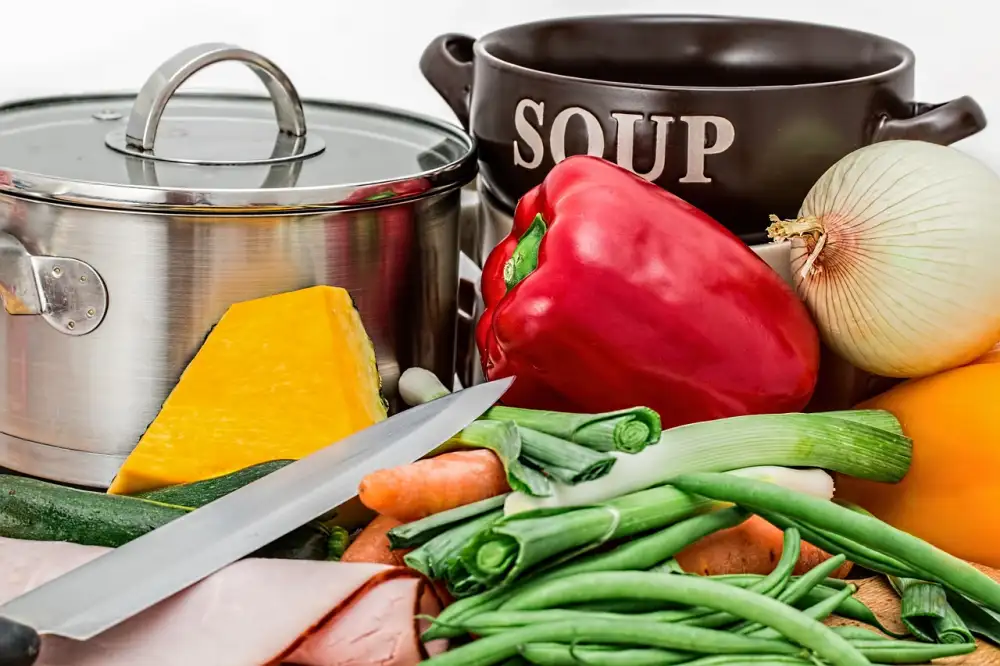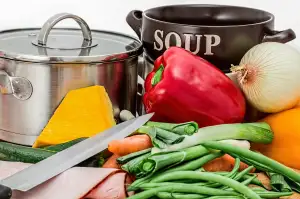Unveiling the Ultimate Recipe Critic: A Delectable Exploration of Culinary Creations

- Definition of a recipe critic
- Importance of recipe critiques in the culinary world
- Elements of a Recipe Critique:
- Presentation and aesthetics
- Flavor profile and balance
- Ingredient quality and freshness
- Cooking techniques and methods
- How to Write a Recipe Critique:
- Start with a brief summary of the recipe
- Describe the cooking process and any challenges faced
- Provide feedback on taste, texture, and overall experience
- Offer constructive criticism and suggestions for improvement
- Examples of Notable Recipe Critics:
- Mention renowned food critics or bloggers known for their recipe critiques
- Highlight their unique styles and approaches to reviewing recipes
- Impact of Recipe Critiques:
- Influence on home cooks and professional chefs
- Role in shaping culinary trends and innovations
- Importance of constructive feedback for recipe creators
- Recap the significance of recipe critiques in the food industry
- Encourage readers to appreciate the art of critiquing recipes for a richer culinary experience
A recipe critic is an individual who evaluates and provides feedback on various aspects of a recipe, including presentation, flavor, ingredient quality, and cooking techniques. Their role is crucial in the culinary world as they help both home cooks and professional chefs refine their recipes for optimal taste and appeal. Recipe critiques serve as a guiding light for creators, ensuring that their dishes meet high standards of excellence and innovation.
Definition of a recipe critic
A recipe critic is an individual who evaluates and analyzes recipes based on various criteria such as presentation, flavor, ingredient quality, and cooking techniques. They play a crucial role in the culinary world by providing valuable feedback to both home cooks and professional chefs. Recipe critics aim to offer constructive criticism that can help improve recipes and enhance the overall dining experience for those who follow them. Their reviews often influence food trends and innovations in the industry, making their insights highly valuable to the food community.
Importance of recipe critiques in the culinary world
Importance of Recipe Critiques in the Culinary World:
Recipe critiques play a vital role in the culinary world by providing valuable feedback to both home cooks and professional chefs. They help improve the quality of recipes by highlighting areas for enhancement such as flavor balance, presentation, and cooking techniques. Constructive criticism from recipe critics encourages innovation and creativity in the kitchen, leading to the development of new culinary trends and elevated dining experiences. Ultimately, recipe critiques contribute to the continuous evolution and refinement of the art of cooking.
Elements of a Recipe Critique:
When delving into a recipe critique, several key elements come into play to assess the quality of a dish. The presentation and aesthetics of a recipe are crucial as they set the stage for the overall dining experience. Additionally, evaluating the flavor profile and balance is essential to determine if the dish delivers on taste expectations. Ingredient quality and freshness play a significant role in enhancing the final outcome, while assessing cooking techniques and methods ensures that the recipe is executed correctly for optimal results.
Presentation and aesthetics
When it comes to critiquing a recipe, presentation and aesthetics play a crucial role in shaping the overall dining experience. The visual appeal of a dish can often set the tone for how it will be received by diners. Factors such as plating techniques, garnishes, and use of color all contribute to the aesthetic appeal of a recipe. A well-presented dish not only entices the eyes but also enhances the perceived taste and quality of the food. Recipe critics pay close attention to these details, as they understand that presentation is an integral part of culinary artistry.
Flavor profile and balance
When evaluating a recipe, one crucial aspect to consider is the flavor profile and balance. A successful dish should have a harmonious blend of flavors that complement each other without one overpowering the rest. The balance between sweet, salty, sour, and umami notes can elevate a dish from good to outstanding. Additionally, the seasoning should be well-balanced to enhance the overall taste without being too salty or bland. Assessing how well the flavors work together is key in determining the success of a recipe critique.
Ingredient quality and freshness
When it comes to evaluating a recipe, one crucial aspect that cannot be overlooked is the quality and freshness of the ingredients used. High-quality ingredients can elevate a dish from good to exceptional, while stale or subpar ingredients can greatly impact the final outcome. Fresh produce, spices, meats, and other key components play a significant role in determining the overall flavor and texture of a dish. Recipe critics pay close attention to the sourcing and selection of ingredients as they directly influence the taste and authenticity of the final creation. It is essential for chefs and home cooks alike to prioritize using fresh, high-quality ingredients to ensure the success of their culinary endeavors.
Cooking techniques and methods
Cooking techniques and methods play a crucial role in the success of a recipe. The way ingredients are prepared, cooked, and combined can significantly impact the final dish. Whether it's mastering the art of sautéing, braising, baking, or grilling, each technique requires precision and skill to achieve optimal results. Understanding when to use high heat versus low heat, how to properly season and marinate ingredients, and knowing when to add certain elements during the cooking process are all essential aspects of creating a well-executed dish. Additionally, techniques such as knife skills for proper ingredient preparation and emulsification for creating smooth sauces can elevate a recipe from good to exceptional. A recipe critic must pay close attention to the cooking techniques used in a recipe to assess their effectiveness in bringing out the flavors and textures intended by the creator.
How to Write a Recipe Critique:
To write a comprehensive recipe critique, start with a brief overview of the recipe. Detail the cooking process, highlighting any challenges faced. Provide feedback on taste, texture, and overall experience. Be sure to offer constructive criticism and suggestions for improvement to help the creator enhance their dish. Remember to focus on specific elements like flavor balance, ingredient quality, and cooking techniques for a thorough evaluation.
Start with a brief summary of the recipe
When embarking on a recipe critique, it is essential to begin by providing a concise summary of the dish being evaluated. This summary should encompass the key components of the recipe, such as the main ingredients used, the cooking method employed, and any unique or distinctive aspects of the dish. By outlining these fundamental details at the outset, both the reviewer and the readers gain a clear understanding of what to expect from the culinary creation under scrutiny. A well-crafted summary sets the stage for a thorough and insightful critique that delves into all aspects of the recipe's execution and flavor profile.
Describe the cooking process and any challenges faced
When describing the cooking process in a recipe critique, it is essential to provide details on each step taken. This includes the clarity of instructions, the complexity of techniques involved, and the overall ease of following the recipe. Additionally, noting any challenges faced during preparation, such as unclear measurements or difficult cooking methods, can offer valuable insights for both the recipe creator and those attempting to recreate the dish. Understanding the intricacies of the cooking process allows for a more comprehensive evaluation of the recipe's feasibility and accessibility to a wide range of cooks.
Provide feedback on taste, texture, and overall experience
When providing feedback on a recipe, it is essential to evaluate the taste, texture, and overall experience. The taste should be balanced, with flavors complementing each other. Texture plays a crucial role in the enjoyment of a dish; it should be pleasing and appropriate for the recipe. The overall experience encompasses factors like presentation, aroma, and how well the dish satisfies expectations. Constructive criticism on these aspects helps both creators and consumers in enhancing culinary experiences.
Offer constructive criticism and suggestions for improvement
When offering constructive criticism in a recipe critique, it is essential to provide specific feedback on areas that can be improved. For example, suggesting adjustments to seasoning levels for better flavor balance, recommending alternative cooking techniques for improved texture, or proposing ingredient substitutions for dietary preferences. By providing actionable suggestions for enhancement, recipe critics help creators refine their recipes and elevate the overall culinary experience for both home cooks and professional chefs alike.
Examples of Notable Recipe Critics:
In the world of culinary critique, names like Sam Sifton from The New York Times and Deb Perelman of Smitten Kitchen stand out. Sifton's reviews are known for their eloquent prose and keen observations on flavor profiles, while Perelman's blog offers a more relatable and approachable take on home cooking. Additionally, food critic Jonathan Gold was celebrated for his exploration of diverse cuisines in Los Angeles, influencing both chefs and home cooks with his insightful reviews. These critics have shaped the way we perceive and appreciate recipes, setting high standards for culinary excellence.
Mention renowned food critics or bloggers known for their recipe critiques
When it comes to renowned food critics and bloggers known for their exceptional recipe critiques, one cannot overlook the influential voices in the culinary world. Names like Sam Sifton from The New York Times, who brings a blend of expertise and approachability to his reviews, or Deb Perelman of Smitten Kitchen, known for her detailed yet relatable recipe assessments, stand out. Additionally, J. Kenji López-Alt of Serious Eats is celebrated for his scientific approach to cooking and recipe development, making him a trusted source for many home cooks and professionals alike. These individuals have carved a niche for themselves in the realm of recipe critiques with their distinct styles and insightful perspectives.
Highlight their unique styles and approaches to reviewing recipes
When it comes to highlighting unique styles and approaches to reviewing recipes, notable food critics like Ruth Reichl stand out. Reichl, a former New York Times restaurant critic, infuses storytelling into her critiques, providing vivid descriptions that transport readers into the dining experience. On the other hand, bloggers like Deb Perelman of Smitten Kitchen focus on creating accessible recipes for home cooks while maintaining a conversational tone in their reviews. Each critic brings their own flair and perspective to recipe critiques, enriching the culinary landscape with diverse insights and opinions.
Impact of Recipe Critiques:
Recipe critiques play a pivotal role in influencing both home cooks and professional chefs. They provide valuable insights into the strengths and weaknesses of a recipe, guiding individuals in creating delicious dishes. Moreover, these critiques contribute to shaping culinary trends and innovations by highlighting emerging flavors, techniques, and ingredients. Constructive feedback from critics helps recipe creators refine their creations, leading to the development of more refined and flavorful dishes. Ultimately, embracing recipe critiques enhances the overall culinary experience for both creators and consumers alike.
Influence on home cooks and professional chefs
Recipe critiques play a vital role in influencing both home cooks and professional chefs. For home cooks, reading critiques can provide valuable insights into improving their culinary skills, experimenting with new flavors, and enhancing their overall cooking experience. Professional chefs often rely on critiques to stay updated on current trends, refine their techniques, and push the boundaries of traditional recipes. By incorporating feedback from critiques, chefs can elevate their dishes to meet the evolving tastes of their customers and stay ahead in the competitive culinary industry.
Role in shaping culinary trends and innovations
Recipe critiques play a crucial role in shaping culinary trends and innovations. By analyzing the feedback from critics, chefs can refine their recipes, leading to the creation of new flavor combinations and cooking techniques. Critiques also help identify emerging food preferences and dietary trends, guiding chefs in adapting their recipes to meet evolving consumer demands. Through constructive criticism and suggestions for improvement, recipe critics contribute to the continuous evolution and diversification of the culinary landscape.
Importance of constructive feedback for recipe creators
Constructive feedback for recipe creators is invaluable as it helps them improve their culinary creations. By receiving honest critiques on presentation, flavor, ingredients, and techniques, recipe developers can refine their recipes to meet the expectations of their audience. This feedback loop fosters growth and innovation in the culinary world, pushing creators to experiment with new ideas and elevate the overall quality of their dishes. Ultimately, constructive criticism plays a vital role in helping recipe creators hone their skills and deliver exceptional dining experiences to food enthusiasts worldwide.
In conclusion, recipe critiques play a vital role in the culinary world by providing valuable feedback to both home cooks and professional chefs. They help improve the quality of recipes, enhance cooking techniques, and inspire culinary innovations. By appreciating the art of critiquing recipes, individuals can elevate their gastronomic experiences and contribute to the ever-evolving landscape of food culture. Embracing constructive criticism ensures that creators continue to push boundaries and deliver exceptional dishes for all to enjoy.
Recap the significance of recipe critiques in the food industry
Recipe critiques play a crucial role in the food industry by providing valuable feedback to chefs, home cooks, and food creators. They help in improving the quality of recipes, enhancing flavors, and refining cooking techniques. Through constructive criticism and suggestions for improvement, recipe critics contribute to the growth and innovation within the culinary world. Their insights not only guide aspiring chefs but also influence food trends and inspire new culinary creations. Embracing recipe critiques enriches the overall dining experience and fosters a culture of continuous learning and creativity in the realm of food.
Encourage readers to appreciate the art of critiquing recipes for a richer culinary experience
Encourage readers to appreciate the art of critiquing recipes for a richer culinary experience by understanding that constructive feedback not only helps recipe creators improve but also enhances the overall quality of dishes. By honing your skills in analyzing presentation, flavor balance, ingredient quality, and cooking techniques, you can elevate your own cooking abilities and appreciation for diverse culinary creations. Embrace the opportunity to provide thoughtful critiques as a way to engage with food on a deeper level and contribute positively to the culinary world.
Published: 12. 05. 2024
Category: Food



